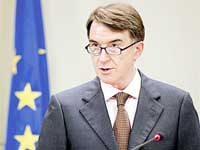Collapse of WTO talks leaves trade round in limbo
The World Trade Organization is running out of last chances.

With emotions ranging from anger to confusion, officials from the WTO's four biggest powers left Potsdam on Friday knowing they had failed to break a six-year logjam between rich and poor countries over eliminating barriers to trade in farm produce and manufactured goods.
That leaves in limbo a new world trade pact aimed at adding billions of dollars to the global economy and lifting millions of out of poverty. Few are banking on negotiations in Geneva among 150 members to turn out more successful than those that involved just the United States, the European Union, Brazil and India.
"We feel like the rug was pulled from under our feet," U.S. Agriculture Secretary Mike Johanns said after the talks ended Thursday, two days ahead of schedule.
Brazil and India criticized the United States for its failure to offer deep enough cuts in the billions of dollars of subsidies it pays annually to American farmers, which critics say unfairly deflate international prices - making it impossible for poorer nations to develop their economies by selling agricultural produce abroad.
The European Union and the United States said the two emerging economic powers refused to offer new market opportunities for manufacturing exports. Brussels and Washington added, however, that they were pleased with each other for showing flexibility.
Behind the scenes, officials debated why the talks were halted prematurely.
European and American officials questioned Brazil's intentions and wondered if it intentionally blocked progress to curry favor with developing countries, many of whom were unhappy with the private negotiations among the four powers. Brazilians accused Washington and Brussels of agreeing beforehand to protect their agricultural interests. Many officials criticized Indian Trade Minister Kamal Nath for arriving late on Tuesday after missing a flight and having a return scheduled ahead of the summit's end.
All sides said they negotiated in good faith.
Failure over the next six weeks to agree on the framework of a deal to cut tariffs and slash subsidies could make an accord impossible for at least three years - or at all - trade officials warned ahead of the meeting. They say subsidy and tariff concessions are very unlikely in 2008, when U.S. elections will be held, and 2009, when Indian elections are scheduled.
But, Amorim said Thursday, "It was useless to continue the discussions based on the numbers that were on the table."
EU Trade Commissioner Peter Mandelson said the failure "places a very major question mark over the ability of the wider membership of the WTO to complete this round."
All four of the powers said a breakthrough would now have to be reached in multilateral talks. Amorim, Mandelson and Schwab headed to Geneva on Friday to talk with WTO delegations excluded from the Potsdam meeting, and a formal meeting of the 150-member body also was scheduled.
Official with knowledge of what happened in the talks said earlier this week that the U.S. indicated it was willing to limit its trade-distorting farm subsidies to US$17 billion (euro12.7 billion). Brazil insisted on a figure somewhere below US$15 billion (euro11.2 billion), according to the officials. The difference was closer than what the two countries have publicly stated.
The EU also showed flexibility on the sensitive issue of farm tariffs, but Brazil and India offered lower cuts in manufacturing tariffs than what they have said in private they could accept, according to officials present in the meetings. Nath, officials said, even claimed India was among the WTO's "least developed countries," which are excluded from having to make concessions in the Doha round.
It is unlikely the two countries will offer more flexibility in Geneva, where they negotiate in unity with countries such as Argentina and Venezuela that are skeptical of industrial liberalization.
The U.S. also was frustrated with India for insisting that 20 percent of its farm tariffs face no cuts or only minimal ones, officials at that meeting said. Johanns has previously said such an outcome would shield up to 95 percent of what India imports from cuts.
Subscribe to Pravda.Ru Telegram channel, Facebook, RSS!




